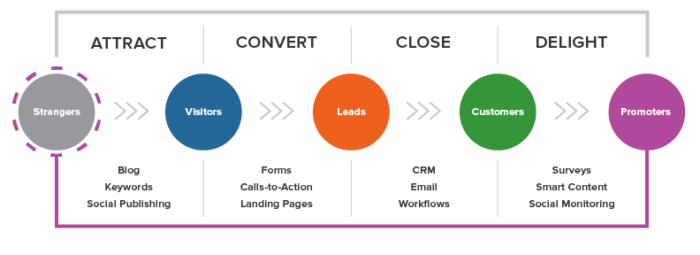



Inbound marketing can be the secret weapon for healthcare software businesses. But getting it right takes a solid strategy, an agile approach, plenty of patience, and a strong understanding of the complexities of the healthcare software market. In this article, we give you a complete guide to the ins and outs of inbound healthcare marketing for software companies.
 Inbound marketing is an approach to attracting leads and customers by sharing useful and relevant content. According to Hubspot, the goal of inbound marketing is to use content to attract new visitors, convert your visitors into leads, transform your leads into customers, and then retain and delight your customers. In turn, these happy customers then become your strongest brand evangelists who can bring in even more referrals.
Inbound marketing is an approach to attracting leads and customers by sharing useful and relevant content. According to Hubspot, the goal of inbound marketing is to use content to attract new visitors, convert your visitors into leads, transform your leads into customers, and then retain and delight your customers. In turn, these happy customers then become your strongest brand evangelists who can bring in even more referrals.
Inbound marketing differs from outbound marketing in that the idea of inbound marketing is to “pull” your target market towards you by offering them valuable or engaging content for free. Some of the most popular forms of inbound marketing include blog posts, webinars, social media posts, and video content. With outbound marketing, your goal is to “push” your business towards your customer by reaching out to people to let them know about your product offer. Examples include banner or print ads, direct mail, cold calling and emailing, and pay-per-click (PPC) ads.
While some marketers tend to position inbound and outbound as a binary choice, we’d argue that a complex market like healthcare software requires a cohesive strategy that straddles the full marketing mix, including both inbound and outbound components. However, it’s worth noting that, if done right, inbound marketing can be particularly successful for healthcare software and healthcare SaaS companies.
The healthcare software market is uniquely challenging. The sales cycle is long, with many healthcare providers taking over a year to make purchasing decisions. In addition, the purchase decision requires input from a wide range of stakeholders, including IT leadership, the finance department, and potentially hospital administrators and medical staff. Each stakeholder has their own set of priorities and concerns, which the healthcare software provider will need to address before closing a sale. To make matters trickier, the healthcare industry is notoriously slow to change – which is hardly surprising, given the heavy regulations and high risks involved in every operational decision.
Inbound marketing is ideal for targeting this market because it can help healthcare software companies overcome all these challenges.
Working with a healthcare software digital marketing agency helps you provide your target market with relevant, valuable content, allowing your company to demonstrate a clear understanding of your prospects’ challenges and interests. With a comprehensive healthcare SaaS content marketing strategy, you can target multiple prospective stakeholders at once, generating interest in every group of potential decision-makers.
Given the long sales cycle faced by healthcare software companies, keeping fixed costs low and maximizing ROI on marketing spending is key to long-term success. Research suggests that inbound leads cost around 60% less than outbound leads.
Inbound marketing is an excellent way to get in front of your prospects without coming across as too “sales-y.” Today’s healthcare software buyers spend a great deal of time researching products online, and strong content will ensure you are among the first products they notice. In particular, working to position your website on the front page of Google can make an enormous difference to the number of prospective buyers who will consider your software.
It’s worth acknowledging that inbound marketing is no magic bullet. For one thing, it takes time to start seeing results. Building a strong online presence, creating a successful blog, finding a readership, collecting a mailing list – in a tough market like healthcare software, most marketing experts estimate that it can take anywhere up to 6 months or longer to start getting a tangible return on your inbound strategy.
It can also be harder to quantify. Unless you are working with sophisticated marketing automation tools, it may be difficult to know if your leads have been attracted to your website by your insightful blog posts, your entertaining social media comments, or your outbound marketing efforts – or a combination of all three!
Finally, inbound healthcare software marketing requires real knowledge and understanding of your target market. Outbound marketing can be a little more generalized – the “spray and pray” approach. Content marketing for SaaS companies requires a more targeted approach that adapts to market changes and news in real time and reflects a clear awareness of what content will be most valuable for your prospective customers.
So, what does it take to create a winning inbound healthcare marketing strategy for software companies? Here are the four key components:
To create the right kinds of content and share them in the right ways, you need a clear understanding of your prospects. This should start with developing or updating your buyer personas. You may also want to interview your existing customers to deepen your insight into why they chose your product. As well as helping you to understand how to frame your product to interest new leads, this will also provide you with invaluable “voice of the customer” information, enabling you to use the exact terms, phrases, and examples most likely to appeal to other potential customers.
To maximize the results that you get from your inbound content, you need to reach your targets across multiple channels, with a cohesive and appealing brand voice. Your content plan should include a regular, valuable, and shareable blog, as well as guest posts on niche industry sites. You should also build a plan for appropriate social media channels, such as LinkedIn, which includes frequent, engaging posts as well as driving more traffic to your blogs. Search engine optimization is also essential – starting by identifying strategic keywords and then targeting them with a rich mix of content to increase your site’s search rankings.
To really deliver inbound healthcare marketing for software companies, you need a specialized healthcare SaaS marketing agency with a firm grasp of the complexities of the healthcare market. You should feel that you have found a true business partner, not just a service provider. To create the kind of high-quality, industry-leading content that will help you stand out from other healthcare software brands, you need a marketing agency that has worked in the industry for years.
For instance, when we partnered with Prevounce Health, we harnessed our expertise in the healthcare industry to identify the most relevant keywords and then built a rich mix of content to help place Prevounce on the first page of Google search results. We coupled this with a customized PR strategy, drawing on our extensive network of connections within well-respected industry publications to increase Prevounce’s brand presence. As a result, Prevounce saw a 1600% increase in closed deals, as well as massive growth in meetings and demo requests.
To find out more about how Spot On could help your healthcare software company reach your digital marketing goals, click here to schedule a time to chat with us.


Rebecca Graves co-founded Spot On in 2012. As a partner and leader of client services, she takes immense pride in being in charge of “client happiness.” The role allows her to wield her problem-solving skills while fostering big-picture perspectives and team building. Rebecca’s more than 35 years of experience have equipped her to translate strategic planning expertise for the advancement of tech companies transforming the healthcare, financial, and legal industries.
Get the latest and greatest posts sent straight to your inbox.


